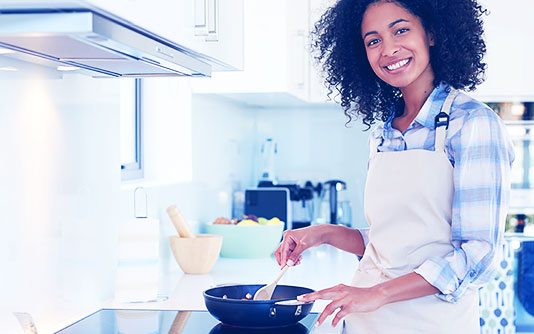
In 2013, there were more than 3,800 dispatches in response to emergency calls about fires in Bermuda, of which 80 were in response to fires that started in residential properties. Fires cause devastation to your home, and have the capacity to spread quickly, causing injury and even death to people and animals.
While the thought of a home fire is disturbing, there are several ways that you can protect your home and loved ones. Argus has put together 10 tips below to help you fire proof your kitchen and home.
1. Do Not Leave Cooking Unattended
When cooking, never leave your food unattended while you do something else, such as watch TV in another room. It is important to stay in the kitchen to monitor food and kitchen appliances while cooking, particularly if you are frying, grilling or broiling food, as food cooked in this way may overheat or burn. . If you must leave the kitchen, even for a short moment, turn off your cooker before doing so.
2. Use Caution with cooking pots
Turn handles towards the center of the stove to prevent people bumping into them or exposing the flames which can cause serious burns.
3. Time your cooking
It is always a good idea to use a timer in the kitchen both for food cooking on the stove and in the oven. A timer is an easy way to help you to remember that you have these appliances on.
4. Dress right
To minimise the possibility of your clothes catching on fire while you cook, do not wear any loose clothing or anything with long dangling sleeves. Also, remove any long dangling jewelry before cooking, and tie up long and loose hair.
5. Have a ‘kid free’ zone
Ideally you should ensure that any young children in the household are out of the kitchen area while cooking. However, if this is not possible have them stay at least three feet away from the stove at all times.
6. Avoid Clutter and Flammables
The area around your cooker should be free from any utensils or appliances that can easily catch fire. Utensils such as oven gloves, wooden spoons, paper, plastic and food wrapping should be kept away from the stove. Equally, any objects that easily attract heat should be stored elsewhere.
7. Keep it clean
To prevent a buildup of grease and food particles, clean cooking surfaces regularly.
8. Keep a Fire Extinguisher
The 2014 Building Code update states that if your house was renovated or built after 1996, by law it should be have a fire extinguisher fitted in the kitchen. Even if your property was built before then it is still worth investing in a fire extinguisher. You might also want to think about purchasing a fire blanket to keep in the kitchen too. These products can quickly and safely put out any kitchen fires with minimal damage.
9. Regular Checks and Inspections
Get into the routine of checking your kitchen before going to bed each night and before leaving home. Make sure all your kitchen appliances are switched off and cooking and oven settings are at neutral. Inspect your appliances from time to time to ensure it does not need servicing or replacing especially compromised electrical cords or gas lines.
10. Install Smoke alarms
Under the Bermuda Building Code 1998 if your house was built was after 1996, or has had major renovations since, it should by law have a smoke alarm fitted. Smoke alarms work best when they are installed near your kitchen and on each level of your home, if possible. Install extra smoke alarms in and outside bedrooms. Have the batteries on all smoke alarms replaced at least once a year and use the test button to check them at least once a month.
 Sign In
Sign In







